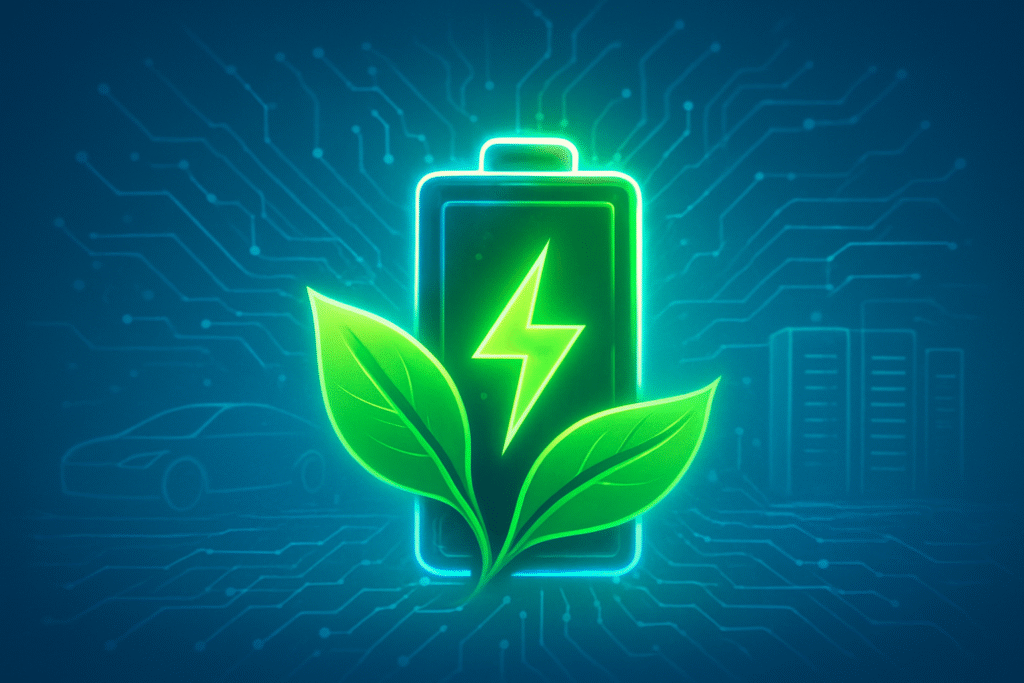
Solidion Technology Inc. (NASDAQ: STI) has been awarded a pivotal grant from the U.S. Department of Energy (DOE) through its Advanced Research Projects Agency-Energy (ARPA-E) OPEN program. Announced on November 21, 2025, this significant funding aims to accelerate the research and commercialization of electrochemical technologies, particularly focusing on the innovative production of high-performance graphite from biomass-derived carbon. This initiative is a crucial step towards fostering American energy independence, reducing reliance on foreign critical energy materials, and championing environmentally sustainable manufacturing within the rapidly evolving battery industry.
The grant underscores Solidion's commitment to pioneering next-generation battery solutions, building upon its already robust intellectual property portfolio. This strategic investment by the DOE not only validates Solidion's cutting-edge approach but also highlights the urgent global demand for greener, more secure, and domestically sourced battery components essential for the electrification of transportation, grid modernization, and the burgeoning energy needs of artificial intelligence infrastructure.
Technical Deep Dive: E-GRIMS and Biomass-Derived Graphite
At the core of Solidion's DOE-backed initiative is the Electrochemical Graphitization in Molten Salts (E-GRIMS) technology, a breakthrough developed in partnership with Oak Ridge National Laboratory (ORNL). This innovation, which earned the prestigious 2025 R&D 100 Award, is hailed as a "game-changing approach" to graphite production. Unlike conventional methods that rely on energy-intensive processes and fossil fuel derivatives, E-GRIMS promises an energy-efficient, scalable, and environmentally sustainable pathway to produce graphite anode materials.
The technical focus of this grant is on leveraging sustainable biomass-derived carbon to create high-performance graphite suitable for battery anodes. Solidion aims for these synthetic graphite anode materials to achieve technical standards of 300-350 mAh/g with over 90% efficiency by 2025. This process is designed to significantly reduce the carbon footprint of lithium-ion battery manufacturing, with studies indicating an 83% reduction compared to synthetic graphite from petroleum coke, and even potential for net-negative CO2 emissions and primary energy consumption. Furthermore, by utilizing low-cost waste feedstock, E-GRIMS could reduce production expenses by up to 80%, making bio-graphite cost-competitive with, or even cheaper than, fossil-based synthetic graphite.
This approach starkly contrasts with existing graphite production methods, particularly in its sourcing and environmental impact. Traditional graphite, whether natural or synthetic, often involves environmentally damaging mining or carbon-intensive processes. With China dominating over 70% of the global graphite supply and 90-93% of battery anode materials, Solidion's biomass-derived solution offers a critical domestic alternative. The company plans to establish a production facility in the Southeast United States with an initial capacity of 10,000 metric tons per annum (MTA) by late 2026, scaling to approximately 180,000 MTA by 2030, directly addressing the projected global graphite deficit. Initial reactions from the research community, as evidenced by the R&D 100 Award, have been highly positive, recognizing the transformative potential of E-GRIMS. Industry experts and investors also reacted favorably, with Solidion Technology's stock (NASDAQ: STI) surging by 83.4% following the R&D 100 announcement, reflecting increased confidence in its technological leadership, despite some financial analysts noting ongoing profitability challenges.
Market Implications: Reshaping the Battery and AI Landscape
Solidion Technology's advancements, particularly in biomass-derived graphite, carry significant implications for a wide array of companies, from electric vehicle (EV) manufacturers to major tech giants and AI data center operators.
Solidion Technology Inc. (NASDAQ: STI) itself stands to benefit immensely, strengthening its position as an "IP leader" in next-generation battery materials. Its extensive patent portfolio, encompassing high-capacity silicon anodes, advanced solid-state, and lithium-sulfur technologies, will be further bolstered. AI companies and data center operators, including industry behemoths like Alphabet (NASDAQ: GOOGL), Amazon (NASDAQ: AMZN), Microsoft (NASDAQ: MSFT), and Apple (NASDAQ: AAPL), are poised to benefit from more sustainable, efficient, and potentially safer energy storage systems. Solidion's recently introduced PEAK Series Uninterruptible Power Supply (UPS) system, specifically designed for AI data centers, offers space and cost efficiencies, directly addressing the soaring energy demands of AI infrastructure.
The competitive landscape for major tech companies will be significantly impacted. Companies that integrate domestically sourced and sustainable materials, such as Solidion's biomass-derived graphite, will gain a strategic advantage in supply chain stability and security, particularly in light of recent graphite export restrictions by China. Furthermore, adopting "green" battery solutions will enhance their Environmental, Social, and Governance (ESG) profiles, attracting environmentally conscious consumers and investors. The performance enhancement for AI hardware, driven by batteries with higher energy density, faster charging, and improved safety, is crucial for the continuous operation and evolution of AI applications, giving companies deploying superior power management solutions a distinct edge.
Potential disruptions to existing products and services are considerable. The shift towards biomass-derived graphite could render traditional, carbon-intensive graphite production methods less competitive. Moreover, Solidion's "in situ solidification" technology for solid-state batteries allows for the conversion of existing lithium-ion battery manufacturing facilities, accelerating the adoption of solid-state technology without massive capital investments. This could significantly enhance the performance and lifespan of products from consumer electronics to electric vehicles, where current battery limitations are often a bottleneck. More efficient UPS systems, like Solidion's PEAK Series, could also lead to reduced operational costs and energy consumption in power-hungry AI data centers. Solidion's market positioning is bolstered by its leadership in sustainable battery materials, offering a compelling "green" differentiator and accelerated time-to-market for solid-state batteries, which could allow rapid market penetration compared to competitors requiring entirely new manufacturing infrastructure.
Wider Significance: A Milestone for Sustainable Energy and AI
Solidion Technology's grant and its advancements in biomass-derived graphite production represent a critical milestone in the broader energy and AI landscapes, aligning with global trends towards sustainability, energy independence, and advanced technological infrastructure.
The global demand for graphite is projected to quadruple by 2030, driven primarily by the electric vehicle and energy storage sectors. Solidion's sustainable approach directly addresses this escalating demand while simultaneously mitigating environmental concerns. The E-GRIMS technology's ability to achieve an 83% reduction in carbon footprint compared to traditional methods, and even net-negative CO2 emissions, positions it as a significant contributor to global decarbonization efforts. Economically, the potential 80% reduction in production costs for bio-graphite could make EV batteries more affordable, accelerating EV adoption and creating new economic opportunities in agricultural communities. Geopolitically, with China's dominance in graphite supply, Solidion's domestic production facility offers a crucial ex-China source, enhancing American energy independence and reducing supply chain vulnerabilities, a strategic imperative highlighted by measures like the Inflation Reduction Act.
While the outlook is promising, potential concerns remain. The scalability of biomass feedstock, ensuring a consistent and uniform supply at an industrial scale, is a challenge that Solidion's ambitious expansion plans (180,000 MTA by 2030) will test. Economic viability, particularly the significant upfront capital investment required for integrated biorefineries, also needs careful management. Market acceptance by major battery manufacturers, who have historically favored synthetic graphite for its consistency, will require demonstrating long-term reliability and performance of biomass-derived alternatives.
Comparing this to previous milestones, Solidion's work echoes the impact of earlier breakthroughs in renewable energy and battery technology. Just as utility-scale solar and wind offered sustainable alternatives to fossil fuels, biomass-derived graphite provides a green alternative to traditional graphite production. Its advancements in more efficient and safer battery materials, including solid-state and silicon-carbon anodes, parallel the initial commercialization of lithium-ion batteries. Furthermore, Solidion's development of the PEAK Series UPS for AI data centers is an early, significant response to the massive energy demands of AI, akin to how innovations in power electronics became critical for early supercomputing and internet infrastructure. This multi-faceted approach positions Solidion as a key player in the ongoing global energy transition and the sustainable powering of the AI revolution.
Future Developments: A Glimpse into Tomorrow's Power Solutions
Solidion Technology's grant and its comprehensive suite of battery innovations paint a vivid picture of future developments across multiple critical sectors.
In the near-term, Solidion plans to construct its biomass-derived graphite production facility in the Southeast United States, aiming for an initial capacity of 10,000 MTA by late 2026, with an aggressive expansion to 180,000 MTA by 2030. This expansion is crucial to address the anticipated global graphite deficit. Simultaneously, the commercial launch of Solidion's PEAK Series UPS system for AI data centers is expected in early 2026, a critical step towards providing high-performance, reliable power for the rapidly expanding AI infrastructure. The company also intends to commercialize a new pouch cell battery for industrial and military drones in the second quarter of 2026, diversifying its market reach.
Long-term, Solidion's patented "in situ solidification" process for solid-state batteries holds immense promise. This technology allows for the conversion of existing lithium-ion battery manufacturing facilities to produce solid-state batteries, significantly reducing capital expenditure and accelerating commercialization within 2-3 years through strategic partnerships. Its Bipolar Electrode-to-Pack (BEEP) technology could further simplify EV battery pack design, enabling ranges exceeding 900 miles. Potential applications span a wide spectrum, from safer, faster-charging batteries for electric vehicles (cars, drones, eVTOL aircraft) to flame-resistant energy storage systems for smart grids and renewable energy integration.
However, challenges persist. Solidion currently faces significant financial difficulties, including negative profitability margins and limited revenue, as it is largely in a pre-commercial stage. While the in-situ solidification process addresses manufacturing infrastructure, the broader solid-state battery industry still grapples with high production costs and integration challenges in EVs. The highly competitive battery sector, dominated by giants like LG Energy Solution (KRX: 051910), Contemporary Amperex Technology Co. Limited (CATL) (SHE: 300750), and Panasonic (TYO: 6752), presents a formidable competitive landscape. Experts view Solidion's technologies with a mix of optimism and caution, recognizing the breakthrough potential of its in-situ solidification process and its strong intellectual property foundation, but also categorizing it as a "high-risk, high-reward" and "solidly speculative" investment due to its current financial state. Nevertheless, long-term trends in EVs, energy storage, and supportive government incentives are expected to drive demand for Solidion's advanced battery solutions.
Comprehensive Wrap-up: Charting a Sustainable Energy Future
Solidion Technology's grant from the U.S. Department of Energy represents a pivotal moment in the quest for sustainable energy solutions and a secure domestic supply chain for critical battery materials. The core takeaway is the validation and acceleration of Solidion's innovative Electrochemical Graphitization in Molten Salts (E-GRIMS) technology, poised to produce high-performance graphite from biomass-derived carbon. This initiative directly addresses the escalating global demand for graphite while offering a significantly reduced carbon footprint and fostering American energy independence.
This development holds profound significance in AI and energy history. It marks a decisive step towards decarbonizing battery manufacturing and establishing a circular economy for energy storage. By providing a sustainable, domestically sourced alternative to traditionally carbon-intensive or geopolitically sensitive graphite, Solidion contributes to a more resilient and environmentally responsible energy future. Furthermore, the company's broader portfolio, including the PEAK Series UPS for AI data centers and advancements in solid-state batteries, underscores a holistic approach to powering the next generation of technology sustainably. The long-term impact could be transformative, reshaping the battery materials industry, accelerating EV adoption, and enabling the robust, green infrastructure required for advanced AI.
In the coming weeks and months, several key indicators will be crucial to watch. Keep an eye out for announcements regarding the progress and specific results from the collaborative research with Oak Ridge National Laboratory. Updates on the commercialization roadmap for biomass-derived graphite, particularly concerning the construction and scaling of the new production facility, will be vital. The commercial launch of the PEAK Series UPS system in early 2026, along with initial sales figures and partnerships in the AI infrastructure space, will provide crucial insights into Solidion's market penetration. Finally, the company's ability to secure additional strategic partnerships and demonstrate improvements in its financial health will be key determinants of its long-term success in this highly competitive and rapidly evolving landscape.
This content is intended for informational purposes only and represents analysis of current AI developments.
TokenRing AI delivers enterprise-grade solutions for multi-agent AI workflow orchestration, AI-powered development tools, and seamless remote collaboration platforms.
For more information, visit https://www.tokenring.ai/.





